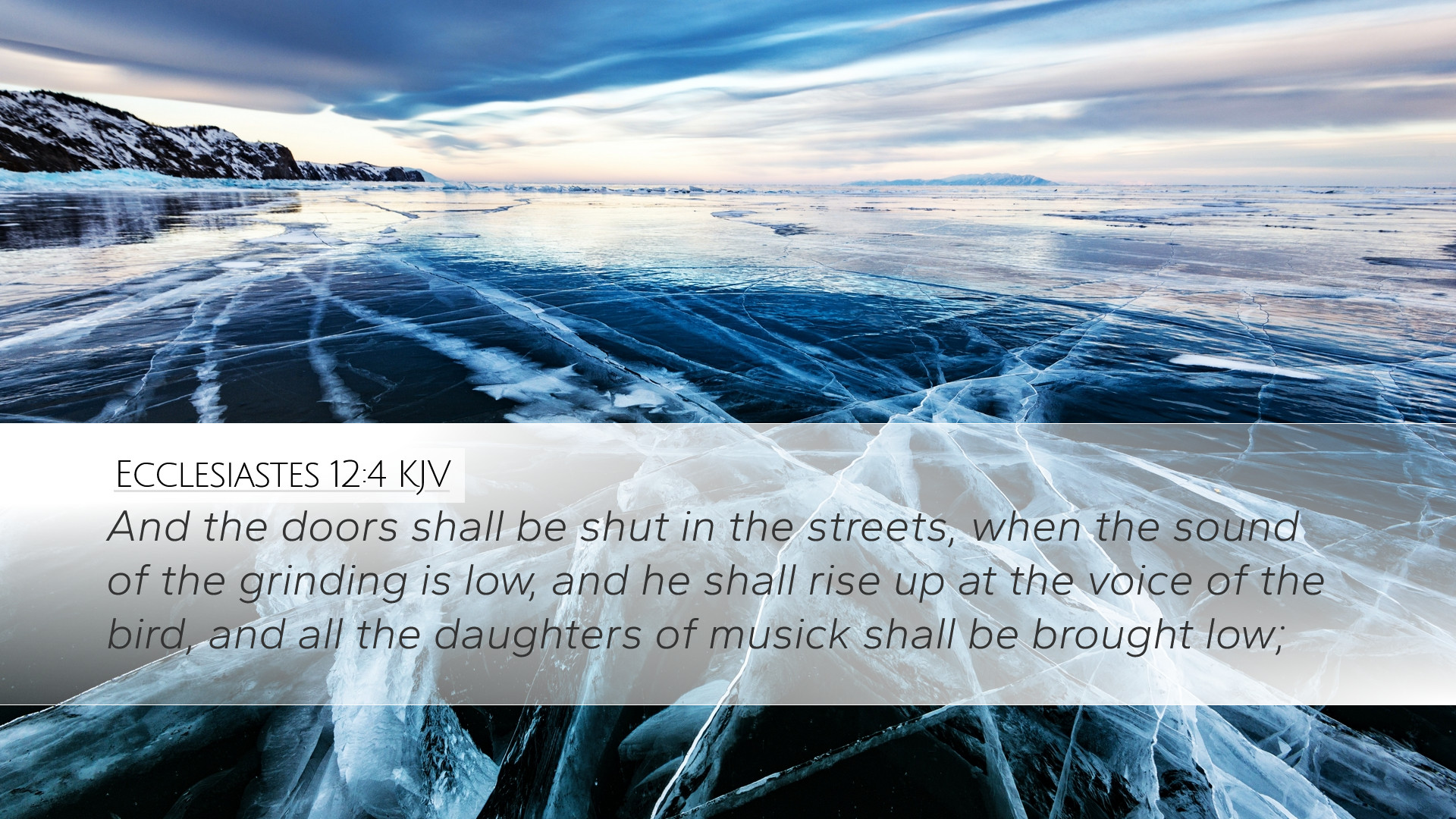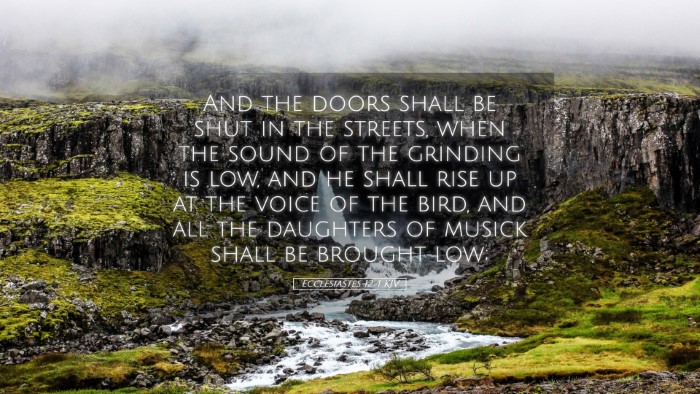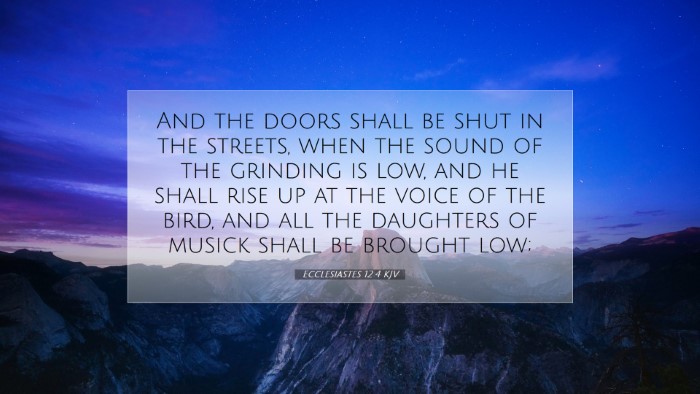Old Testament
Genesis Exodus Leviticus Numbers Deuteronomy Joshua Judges Ruth 1 Samuel 2 Samuel 1 Kings 2 Kings 1 Chronicles 2 Chronicles Ezra Nehemiah Esther Job Psalms Proverbs Ecclesiastes Song of Solomon Isaiah Jeremiah Lamentations Ezekiel Daniel Hosea Joel Amos Obadiah Jonah Micah Nahum Habakkuk Zephaniah Haggai Zechariah MalachiEcclesiastes 12:4
Ecclesiastes 12:4 KJV
And the doors shall be shut in the streets, when the sound of the grinding is low, and he shall rise up at the voice of the bird, and all the daughters of musick shall be brought low;
Ecclesiastes 12:4 Bible Commentary
Commentary on Ecclesiastes 12:4
Ecclesiastes 12:4 serves as a profound reflection on the seasons of life and the inevitable passage of time. Here, the Preacher, traditionally understood to be King Solomon, encapsulates his wisdom and observations on aging, mortality, and the human experience.
Text of Ecclesiastes 12:4
"And the doors shall be shut in the streets, when the sound of the grinding is low, and he shall rise up at the voice of the bird, and all the daughters of music shall be brought low."
Contextual Background
This verse is situated within the closing chapters of Ecclesiastes, where the themes of life’s vanities and the finality of death come to a poignant climax. The whole Book of Ecclesiastes often reflects on the fleeting nature of life and encourages readers to seek eternal values amidst the temporal nature of earthly pursuits.
Thematic Analysis
The verse uses metaphorical imagery to illustrate the decline that accompanies old age and conveys a deep philosophical insight into the nature of life and its transience. Below, we delve into the central ideas reflected in this passage:
-
The Shut Doors
The phrase "the doors shall be shut in the streets" symbolizes the closing off of opportunities and experiences with age. Matthew Henry notes that it reflects a time when social interactions diminish and the bustling life of youth becomes quieter, paralleling the inevitable decline of physical vitality.
-
The Sound of Grinding
The metaphor of "the sound of the grinding is low" refers to the diminishing ability to work and provide. Albert Barnes highlights that grinding grain was a common daily activity, which suggests a change in one's capacity to engage in labor as one ages. This symbolizes the loss of strength and vitality.
-
Awakening to the Voice of the Bird
This imagery of "he shall rise up at the voice of the bird" indicates a return to a state of helplessness and an awareness of the surrounding world even in the twilight years. Adam Clarke comments that this portrays the shift from the energy of youth to a more reflective and subdued existence, where even the slightest sounds command attention due to the overall quietness of life.
-
Music and Decline
Finally, the phrase "all the daughters of music shall be brought low" suggests the fading joy and vibrancy (music often symbolizes joy) that life once offered. This reflects the sorrow of lost abilities and the dulled emotions that often accompany old age. The once vibrant aspects of life become subdued, drawing a stark picture of the inevitable decline that comes with aging.
Theological Reflection
From a theological viewpoint, Ecclesiastes 12:4 serves as a somber reminder of human fragility. Its vivid imagery prompts profound reflection on the nature of existence and the distance between youthful vitality and the approaching end of life. Solomon seems to urge his readers to prepare for this reality, emphasizing the importance of making the most of our days (Ecclesiastes 12:1).
Practical Applications
For pastors, students, and theologians, this verse encourages several vital applications:
- Preparation for Death: The acknowledgment of mortality should guide believers to live purposefully and treasure their days.
- Emphasis on Community: Recognizing the imagery of closure in the context of community can lead to an emphasis on fellowship and nurturing relationships throughout life.
- Value of Wisdom: The ultimate conclusion in Ecclesiastes is to fear God and keep His commandments (Ecclesiastes 12:13). This points toward the importance of imbuing life with wisdom that transcends mere existence.
Conclusion
In conclusion, Ecclesiastes 12:4 encapsulates the somber yet profound truth about the human condition. The imagery serves as a powerful call to reflect on our lives, prioritize what truly matters, and find meaning in the transient nature of our existence. By delving into such texts, scholars and ministers alike can uncover layers of wisdom that challenge and edify the Church in its understanding of wisdom, life, and the preparation for eternity.


